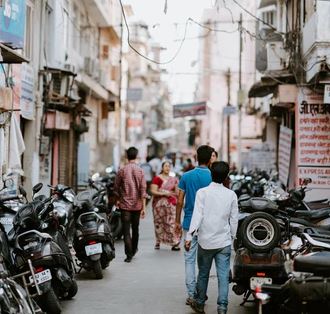India, June 1 (Reuters) – India’s annual economic growth rate picked up in January-March compared with the previous three months, but economists are increasingly pessimistic about this quarter after a huge second wave of COVID-19 infections hit the country last month.
A slow vaccination drive and local restrictions after a massive second wave of infections and deaths across the country have hit economic activities like retail, transport and construction while putting millions out of work.
For similar articles, join our Whatsapp group for the latest updates. – click here
India has recorded 28 million COVID-19 infections, second only to the United States, and 329,100 deaths as of Monday, although the rise has begun to slow.
Gross domestic product grew 1.6% in January-March compared with the same period a year earlier, mainly driven by state spending and manufacturing sector growth, data from the statistics ministry showed on Monday.
Economists said the country faces a slowdown in consumer demand as household incomes and jobs have declined, with limited scope for the government to offer growth stimulus due to its rising debt.
Sakshi Gupta, senior economist at HDFC bank, said while the year-on-year numbers for the April-June quarter might look upbeat due to a low base, the sequential growth is likely to contract.
“With the spread of the virus more acute in rural areas in this wave, rural demand and sectors dependent on the rural economy might come under stress.”
Economists have cut their growth forecast for the fiscal year that began in April to 8%-10% from an earlier 11%-12%.
Consumer spending – the main driver of the economy – rose 2.7% year-on-year in January-March following a revised 2.8% fall the previous quarter, data showed.
Annual growth of 6.9% in manufacturing and 14.5% in construction during the three months to March reflected signs of a recovery before the second wave hit the country.
Investments rose 10.9% compared with growth of 2.6% the previous quarter, while state spending jumped 28.3% after almost no growth in the October-December period, data showed.
India also revised its annual GDP estimates for the fiscal year, predicting a 7.3% contraction, narrower than its earlier forecast for a downturn of 8.0%.
SLOW VACCINATION
Prime Minister Narendra Modi has faced criticism for the slow pace of his four-month-old vaccination campaign, which has inoculated fewer than 4% of India’s 1.38 billion people.
The central bank, which has kept monetary policy loose while boosting liquidity to the economy, said last week the country’s growth prospects will depend on how fast India can arrest infections.
Analysts warn that the slow rollout could pose medium-term risks to growth, especially if the country were to experience a third wave of COVID-19.
Unemployment soared to a near one-year high of 14.7% in the week ending May 23, according to the Centre for Monitoring Indian Economy, a Mumbai-based private think tank.
Krishnamurthy Subramanian, chief economic adviser at the finance ministry, said that some growth momentum had been lost after a surge in virus cases.
“India continues to need monetary and fiscal policy support,” he said after the release of data.
Subscribe to our Whatsapp channel for the latest updates on the news you need to know





























































